#imagine some dude kills you and this is in the text that “justifies” your murder
Explore tagged Tumblr posts
Text
i was gonna post this two months ago but i forgot, anywho here is Payton manifeso cringe comp









#not really the substance itself is cringe but the wording.....#other then the sam hyde thing that was cringe no matter what he said#like#imagine some dude kills you and this is in the text that “justifies” your murder#id be so pissed id haunt that dude FOREVER.#also its really telling that the parts that are his own original work are the ones focused on weaponry/armor stuff#while the stuff about his “ideology” is mostly just copy n paste lololol#might read it again sometime cause its been awhile idek#payton gendron#teeceecee#tccblr#true cringe community
67 notes
·
View notes
Text
Top 12 Most Unfuckable Men In FFXIV (according to a lesbian)
(WARNING: This list contains spoilers up to 5.0)
12. Urianger Augurelt

Urianger is the least unfuckable man in Final Fantasy XIV. Mostly because, well - look at him. That’s the look of a man who has either fucked a lot or never once in his life, and we all saw Moenbryda. If Urianger told me he wanted to “smasheth mine pussy” I would have no choice but to accept, if only because it’d be an experience. There is nothing wrong with wanting to fuck Urianger.
11. Aymeric de Borel
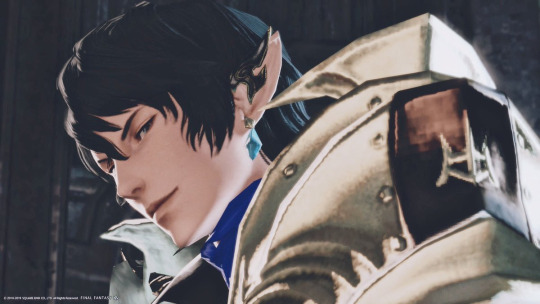
Aymeric was originally in Urianger’s spot when I was thinking about this list, and the only reason he’s not is because he has definitely never fucked before in his life. So aggressively has he never fucked that when he was born, he had to come out via cesarean section, so that he might not have touched pussy even once. You would have to have a several year long committed relationship with him and it still wouldn’t happen until after his dumbass best friend gets possessed by a giant dragon and he’s trying real hard to stave off those Unholy Urges. It doesn’t work. This does not change the fact that, if I had to choose a man, I would be honored for Ser Aymeric de Borel to have a seat on my face.
10. Crystal Exarch

Haurchefant wants what the Crystal Exarch has: he’s smart, he’s cute, and his body is partially composed of rocks. All he wants is to go on an adventure with you, and maybe hold your hand. I feel like fucking the Crystal Exarch isn’t even sexual at this point, your emotional connection is just so deep that it’s only right to make him cry over and over. You’re being a good friend. You should fuck the Crystal Exarch.
9. Cid nan Garlond
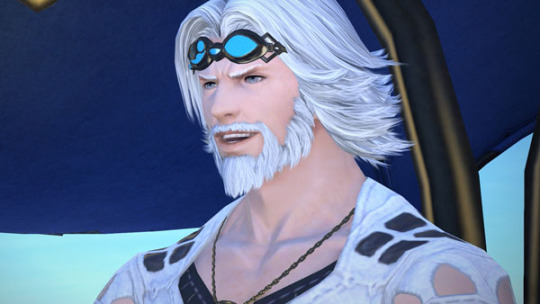
I feel like Cid is the true neutral of this list. He’s funny, not objectively bad looking, loves to make shit for you and showers regularly. Unfortunately, he is not exceptionally memorable on a list of Male Characters I’d Be Interested In Maybe Fucking, If I Had To. I was almost done with this list before I even remembered that Cid is a major character, and not your best friend who you would never even consider fucking, just because that’s the kind of relationship you guys have. I would not fuck Cid, but not because there’s anything wrong with him; I just don’t want to fuck him. Sorry, Cid.
8. Gaius van Baelsar

Gaius van Baelsar definitely smells bad. He’s tried to kill you more than once, and two of those times was with a big robot that had god powers. However, like, just look at him. Imagine if he washed his hair. We all know how tall Alphinaud is, right? Look at how small he is by comparison. This is, in truth, the only reason he is in this spot and not one lower - he’s basically just a Metal Gear Solid character, which I am not mad about at all. I kind of wish Gaius was my father figure, and if, at some point, I ended up fucking him, I don’t think it would be the end of the world. I don’t think you should go out of your way to fuck Gaius van Baelsar, but if it happens, it happens, right?
7. Estinien Wyrmblood

I really wish I could justify ranking Estinien somewhere above Gaius. I really do. If I wasn’t trying to be at least semi-objective, he’d be right below Aymeric. He’s just so spiky. And Mean. And Sad. Unfortunately, I regret to inform you all and remind myself that there is no way that Estinien Wyrmblood does not, on a constant basis, smell like the inside of a Taco Bell, and I’m, like, at least 75% sure that he doesn’t know how to read. There also wouldn’t be much of a chase if you wanted to fuck Estinien, but unless he’s like, in love with you he’s also a very wham-bam-thank you ma’am kind of guy, and I’d be more into it if I got to braid his hair afterwards and gently reassure him that things were going to be okay. I wish I could recommend that you fuck Estinien, but I don’t think that’s the kind of physical comfort he needs right now.
6. Zenos yae Galvus

After Estinien I wasn’t sure who to put next, just because starting around here you get to Men I Am Neither Disgusted By Nor Benevolent Toward the concept of fucking, and I didn’t even think I had any of those until my friend, no hesitation, said “Zenos.” She is right. Zenos is pretty, he’s huge, he kills a lot of people and enjoys the job. This is a charm point for me. He also has absolutely no character traits otherwise so all he has is that he’s Pretty and Likes Murder. Talk to me again when he has depression and maybe we can re-evaluate.
5. Thancred Waters

Thancred and I have had a very tumultuous relationship. In ARR, he was alright. My opinion of him improved significantly in Heavensward, where he was just a long-haired eyepatched hobo who refused to revisit human civilization because he didn’t want to wear pants. In Shadowbringers, he just turned into a shitty dad, and I did not like that shit at all. They took his eyepatch and his ponytail and gave him Shitty Parenting Skills. If Thancred were my father figure, I would simply not speak to him. I could not be persuaded to fuck Thancred.
4. Magnai Oronir

I don’t need to explain this one.
3. Nabriales

I don’t think Nabriales is too much worse than, like, Lahabrea, in terms of fuckability - meaning that, if pressed, I would not choose to fuck either of them - but every time I get the Chrysalis in Trial Roulette half the party immediately drops. The Chrysalis isn’t even that hard, guys, just make sure someone limit breaks the tear. I love to MT the Chrysalis. As someone who consistently gets Thornmarch and Steps of Faith in Trials Roulette, I will kick the shit out of Nabriales any day. Just, not sexually. At all. Maybe a little bit if the off tank would turn off tank stance.
2. Hien Rijin

Hien is pretty cute. Unfortunately, he is also an imperialist, even though the MSQ doesn’t want to talk about that at all because he’s your buddy. Every single time I got a quest like “talk to Hien!” I would get so mad. I don’t want to talk to Hien. Every time I talk to Hien he just wants me to help him infringe on another race’s cultural events for his benefit. It wouldn’t even be a problem for me if it wasn’t encouraged and entirely uncriticized by the narrative. I don’t want to see or be seen by Hien.
1. Haurchefant Greystone

I didn’t play FFXIV for three years because I thought Haurchefant was a main character. Literally, for like, three years, many of my friends were like “Play FFXIV!” and I was like “no!” because I didn’t want to hear about Haurchefant more than I already had to. By the time I met him in MSQ, I was willing to give him a chance. I got it, at the beginning - he’s helpful, he’s complimentary. The problem is, that’s it. I think he sounds like Kif Kroker, and I think I would rather die than fuck him, which is saying a lot coming from me since I think most aliens are super sexy. After I knew Haurchefant for, like, two weeks, he invited me to come to his house and he was like “you have no idea how long I waited for this!” You waited two weeks, man. I understand that you live in an icy tundra and you’ve not felt the touch of another in years, because that’s the only way you could possibly be this horny by the time I stumble into your office, but Jesus Christ, dude. I wish I could be friends with Haurchefant, but I know this is simply not possible since he is so deeply horny that once the point was made the friendship could no longer recover. I am truly, deeply glad that I’ll never have to worry about having a Tinder date with Haurchefant go awry and he will never send me fifty texts asking for photos of my feet. Haurchefant is the most unfuckable man in Final Fantasy XIV. Sorry, Haurchefant. I wish things could be different.
HONORABLE MENTIONS:
1. Nero tol Scaeva
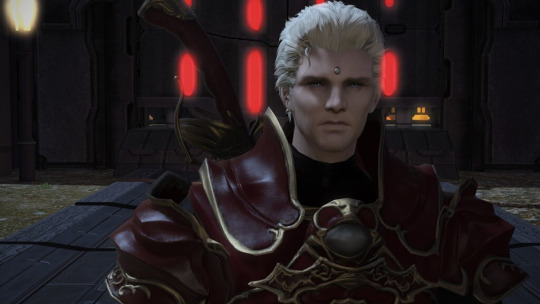
Nero fucking sucks. I would probably fuck Nero. You should not fuck Nero.
2. Emet-Selch
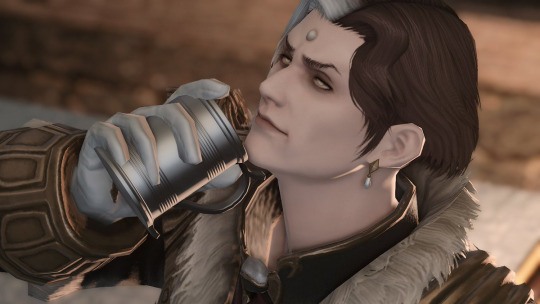
I’m pretty sure that Emet-Selch wouldn’t even be DTF, at least not with the Warrior of Light. On the off chance that he was, though, I would definitely fuck Emet-Selch. I cannot see any good reasons why I shouldn’t fuck Emet-Selch. He is greasy, and old, and talks in riddles. This is extremely sexy to me. If these things are not extremely sexy to you, I don’t think you should fuck Emet-Selch.
193 notes
·
View notes
Text
free will, predestination
So i’m reading through my Presbyterian Heritage and Polity notes in preparation for my ordination exams next week and figured I’d throw all the theology that confuses me most into one text post.
Providence and Free Will
According to Calvin, God is a micro-manager:
There is no moment in your life when God is not with you, actively loving you in that moment
At its best, providence means that God is active in all parts of the world
And then this is where it gets bizarre and confusing and i just gotta be like Calvin. honey. no.
Because Calvin’s idea of free will is the compatibilist idea – free will is compatible with divine determinism
Shannon’s example: Today I put on a green shirt; God determined that I would put that green shirt on. I had the agency, I had to go through the process of choosing the shirt and putting it on, but it would not have happened if God had not determined it.
So like, I did use free will to pick my shirt – but God also made it happen. Somehow…both…are true
Everything has two layers: human agency & intention, and divine agency & intention.
Meanwhile, other theologians have another take on free will – the incompatibilist idea (Gustavo Guierrez is on this team and so am i)
God limits Hir power, gives us room to do things that are against the will of God
SO YEAH, Calvin alludes to Amos being like, “There is no evil in the city but God has done it” – like, if something bad happened it’s because God determined it will.
I just. Nope. Sorry guess it’s just the Catholic in me jumpin out but No Evil Thing Comes From God thank you very much
Shannon spent so much time and energy trying to make this make sense for us and trying to explain how the heck Calvin could believe this stuff, I love you Shannon you work so hard. has the seminary given you a raise lately? they should
Calvin’s context is key to understanding why he thinks what he does about free will
he was writing in a time of communal danger -- his community had been kicked out of the Church and exiled from their country, and feared violence from several sides
what he was saying is that no matter how messed up everything seems, we are actually safe as kittens in the hands of God
There is no part of what is happening that is beyond God’s control and loving care
see like. I agree with that wholeheartedly. God deeply cares about what’s going on – but I can only imagine Xe has limited Hir control over what’s going on or bad shit wouldn’t happen
But yeah Shannon was like “when it’s communal endangerment like what Calvin’s little community of excommunicated refugees were going through, this theology is comforting. When it’s individual pain like a rape or abuse, it’s less comforting. When it’s suffering viewed on a global scale, that’s also less comforting”
Shannon admits she doesn’t believe that even Calvin himself would believe this stuff today – his view of suffering was so local; we now see suffering across the centuries and across the world and how race and gender and all play into that
“I don’t think it really works to say let’s take this theology and apply it to individual cases where it would be harmful, or this massive case of race across the last six hundred years”
Which is basically her way of saying we shouldn’t go with his view of free will these days i’m pretty sure. Whew. Thank you, Shannon
Okay, you know, I do kinda get it…like. If you are in a community like Calvin’s (or like ancient Judah when people wouldn’t stop conquering them and their sister nation just got frickin. wiped out.) and you are Completely Powerless, your survival depending on the Whims of rulers who don’t give a damn about you….it makes sense that thinking that everything, even the Bad, is being pre-ordained by God.
Like, “my life is not just determined by the shitty choices made by people in the past or present, but also by a God who intends good for me.”
…But then Calvin loses me again because when it comes to wondering why God decided to make the world like this – why God not only allows but apparently determines suffering –
Calvin is like, “uh that curiosity is a sin.” Calvin says you’re not supposed to ask those questions – that asking questions is good but there’s a limit
Uh, dude, ya ever read Habakkuk?? we’re allowed to ask God why
Anyway, as if that weren’t all baffling enough it’s time for the really hard part --
Predestination!!
So. One of the core beliefs of Reformed theology is that no part of us is not tainted by sin -- if we were pools of water and sin were ink, we’d see that the ink has permeated the whole pool, not just parts of it.
Therefore, as Shannon says, “it would be really bad news if our salvation were based on getting it right” -- our wills are so bound up by sin, we would not be able to save ourselves.
“Help, we’ve fallen and we can’t get up”
Luckily, no part of our salvation is up to us -- it’s all up to God
“it would be logical, Calvin says (i personally disagree bc dude wtf), for God to just throw us all away – but God decides to save all of us. What this means is that our eternal state, whether we are in heaven or hell, has no causal relation with our works on the planet. How we behave does not determine whether we go to heaven or hell. It’s God decision, made before we are born, not based on how we’re gonna be – God just decides.”
That being said...
“If God decides we are among the elect, we get some goodies – and that can help us screw up a little less in the world. But God’s grace comes first; we still cannot save ourselves on our own”
The “goodies” Shannon’s talking about are like, virtues or something; a desire to do good -- so like, we can have a pretty good idea of who is “elect” based on their actions (i’m not a fan of this and Shannon admits it’s been used to judge and stuff)
“So God saves us, and we respond to that with gratitude.”
Why this idea was a big deal back in the day, whether you agree or not:
Calvin’s idea of predestination was the ultimate stripping of power from the Roman Catholic Church – God decides, not the pope or bishops or priests; it’s not based on how good I am or how much money I have for indulgences
Some context:
Calvin is teaching all this to people who are studying to be pastors. They’re going to be going back to places where they can be killed for these beliefs – they are scared they will be murdered, and most of all they are scared they will recant under torture.
Calvin tells them: God has already saved you. You would not be in this room if God had not. If you recant, it does not undo that fact. – incredibly comforting for them
So don’t be scared – instead, you can respond to God’s grace
The idea of being “elect” should not cause one to be proud but act with humility
It is radically against Calvin’s predestination to imagine you are superior for your elect status; you have nothing to do with it
You should never be proud and judging other people for not being “good Christians.” You were not saved because you were a good Christian. You are learning how to be a good Christian because God saved you while you were a screw-up.
There is no illusion of meritocracy in Calvin’s grace theology – grace is free. No one earns it.
Okay. So. there are actually two “kinds” of predestination you can believe in:
Double Predestination:
God picked some people for heaven and picked some for hell
“I think that the number of PCUSA Presbyterians who believe in double predestination can be counted on two hands”
Single Predestination:
everyone is originally headed to hell, but God picks some for heaven (God didn’t elect anyone to hell as in double predestination; i.e. God does not actively damn anyone, God just doesn’t actively save them)
And another option based on that:
You can argue that grace is free for absolutely everybody -- everyone has been elected, predestined for heaven
Barth is one who says that every human being is predestined to heaven
What about atheists and/or non-Christians?
faith is a requirement but also a gift
broaden the idea of what the response to being elected is
did Calvin assume everyone elect was in the church? yes. But his theology does not actually require it.
maybe a faithful response can mean more than blatant assent to Christ
___
The monster under the bed of all this predestination stuff is the Protestant Work Ethic that developed from it after Calvin’s death
everyone trying to demonstrate that they are among the elect by being better
that’s the exact opposite of Calvin’s point!
this attempt to prove we’re elect evinces our sinful nature:
oh, we don’t work to earn our salvation? okay, we’ll work to prove it instead
and a pit of guilt:
some of us feel like we have to work nonstop for the betterment of the world as we live out our salvation
the theological definition of pride is the attempt to justify your own life
“I know that my life is worthwhile because I have these friends, I’ve accomplished these things, I help these people”
Calvinist theology says No, your life has already been justified and you didn’t have anything to do with it. And now you live that out in gratitude and grace of others.
To sum all this up,
There’s a lot of Calvin’s thoughts here that I don’t think I agree with. I absolutely do not believe that evil things are determined or willed in any way by God -- but I do understand a little better the context that led Calvin to believing that.
I also only like a Predestination that argues that all humanity has been elected -- because “God shows no partiality” -- how or why would God only have chosen some of us sinners and not others? Is God arbitrary?
Still, I like how this theology of Predestination was part of Calvin’s attempts to do away with meritocracy. That’s something so many of us, especially people like me who are white and act like we are successful because of our own merit (we “pulled ourselves up by our own bootstraps” without regard for all the unearned privileges that support our economic well-being) could stand to learn. We don’t earn salvation -- it’s a gift. If we truly grasped that, we would be liberated from our sense of guilt and shame and from our pride.
But even though I get it a little better, I really hope that predestination does not show up on the exams next week.
56 notes
·
View notes
Text
reaction post typed while watching SPN 14x12 “Prophet and Loss”
me: (◕︿◕✿)
i’m too soft™ for this
03:26pm
i am NOT READY in any way, shape or form
but i have a standard-quality video file and a 720p one is downloading slowly
i saw the promo video thing, dean’s phone battery died and i swear my heart died with it
i’m with cas on the “no suicide please” train
on the one hand, this is a deadly duo episode and i don’t trust them. BUT, they have been less awful recently. so. i’m like. expecting some gay. but that gay is ultimately gonna feel like queerbaiting, right?? LET’S HOPE NOT
fingers crossed for real gay, just in case i jinx it by doubting it
-
03:29
HERE GOES
-
03:31
the box underwater
THIS BETTER BE A DREAM
-
03:32
THE TERROR ON DEAN’S FACE IS MAKING MY HEART POUND I DON’T LIKE THIS ONE LITTLE BIT
-
03:33
the blood on the walls from his fingers
jeeeeeeeeeeeeeeeeeeeeeez
;~;
-
03:34
so far enjoying the directing here
dean’s got a red light saying nope, not changing his mind
sam’s behind him every step of the way
now sam’s trying to build a bridge between them (art on the wall)
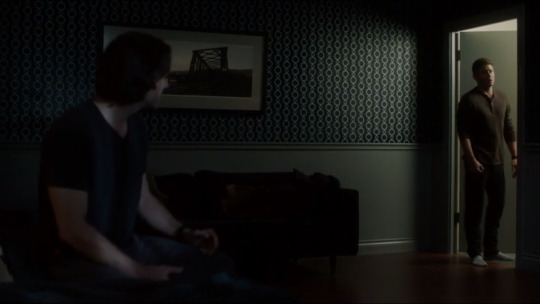
-
03:38
just............ sitting here............. recoiling constantly from the screen while this dude does whatever he’s doing to his girl
deeply uncomfortable
-
03:41
so dean hasn’t even told cas and jack
oh man
-
03:42
OH MAN SAM ALREADY TOLD CAS
OH MAN
-
03:42
the fact dean shoulders open the bathroom door without touching it and dries his hands on his jeans is a) so beautiful, and b) so relatable
-
03:45
the guy with the knife again
i winced away from the screen so hard i pulled a muscle in my neck
goddamn i forget how wearing earbud headphones means i can’t just close my ears or move away from the distressing noise
-
03:39

sam: “if we could not have conversations that sound like deathbed apologies, i would really appreciate..”
i fricking cannot with my emotions right now
also john winchester is an asshole
-
03:56

THE SMILE
;A;
“it’s so good to hear from you!!!!”
;A; ;A; ;A;
-
03:58
dean: “so thank you, and, um........................ it’s good to hear your voice”
;~;
-
04:01
why do people say “you don’t have to do this” when tied up and in danger
i find that a strange thing to say? idk
-
04:50
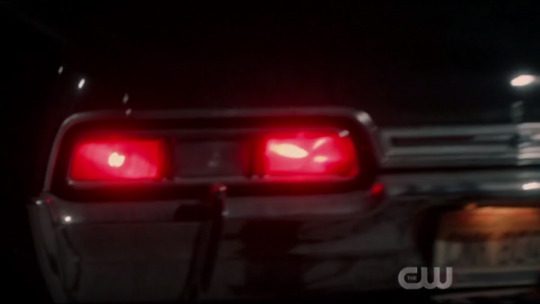
more red lights
a lot of red lights in this
-
04:07

another one
-
04:14pm
switching to 720p because the download’s finally done
also do women actually wear those kinds of frilly night gowns??? or is that just what people imagine “lady life partner who died violently in the night to further the manpain” to wear
-
04:17
sarah: “you wanted him... you still do.... you didn’t come here to find peace, you came here to the place where you became one with him”
sounds gay and evil
-
04:19
sarah: “you can’t.... because you are him”
i mean that makes sense, if an angel is in a host for a long time and does the same acts over and over and feels certain emotions, the host’s brain pathways would form that way, to continue doing and feeling those things
but also i guess nick said yes in the first place, and continued to allow lucifer to use him, because he was that way inclined to begin with
......you know, by the same logic, jimmy probably had feelings for dean tbh
-
04:22
i kept expecting sarah to explode in a justified ghostly rage and set the walls on fire
but here we are..........
not with a bang but with a whimper
-
04:23
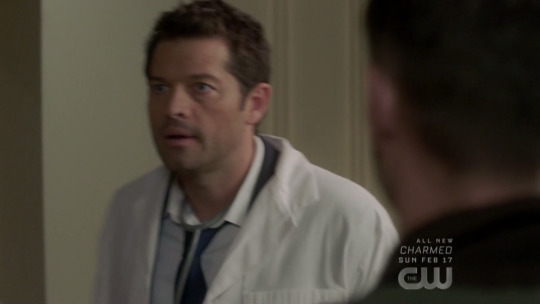
kjasdufshfsdhfhFDSKJGJDSJGSJDKGJKDJGJDJGJKGJKGDFJKKJG
this screenshot of cas is a screenshot of me reacting to this screenshot
(also the noise dean’s brain is making)
-
04:25
“doctor”
this screenshot doesn’t show the subtlety of all his movements BUT HE’S FUCKING trying not to look THRILLED LOOK AT THAT ALMOST-SMILE OMG.
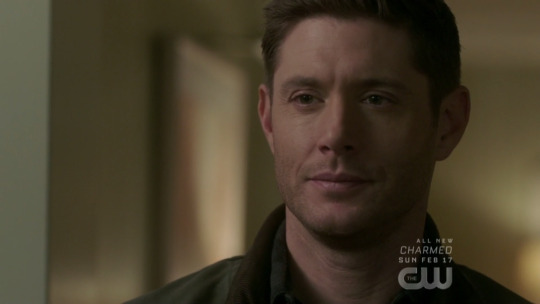
just a hair’s breadth from flustering and looking down the way he did with dr. sexy maybe??? tbh he also looks sad, he would be a lot happier if he weren’t about to lock himself in a box for eternity
the lil gulp as well ?
definitely lowkey flustered, i’m calling it
-
04:29
yup, cut to sam and the real doctor WHILE DEAN AND CAS HAVE A SILENT CONVERSATION OFF SCREEN yes/yes?
-
04:32

“oh, no. no, please don’t compare this with your suicidal plan. just stop.”
he SO MAD
i love cas more than words can say
-
04:34
cas: “so then.......... this is goodbye?
THE LOOK IN THEIR EYES


MY HEART IS BREAKING OH NO
-
04:35
And then SAM INTERRUPTS
ARE YOU KIDIDNG ME
ARE YOU FSDUFVJSDGVJ ING KIDDING ME
well at least that means there’s still something to be said between them, still eternally unsaid
-
04:37
cas: “dean, if there’s a spark, a hope, then i have to try”
aaaaaaand there’s the parallel again, if cas can save donatello then he can save dean
-
04:38
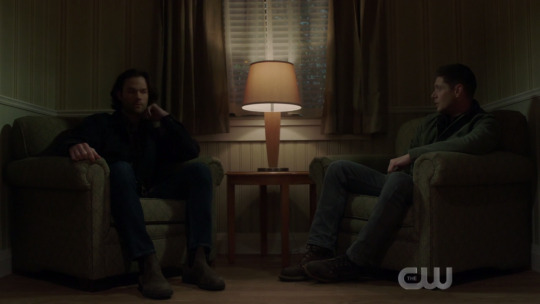
YELLOW LIGHT GREEN ROOM
WE’RE GETTING SOMEWHERE
and of course cas was the one who, by appearing, changed everything
-
04:43
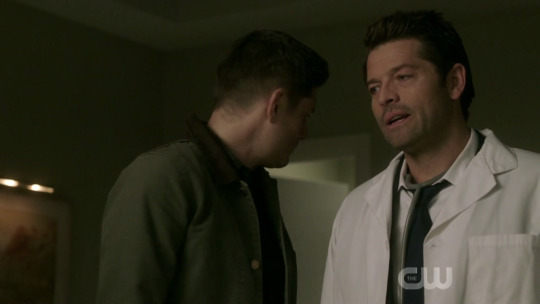
this is so stinking cute i love seeing them together doing ANYTHING AT ALL i love them both so much
-
04:44
also they talk v close and it feels v intimate
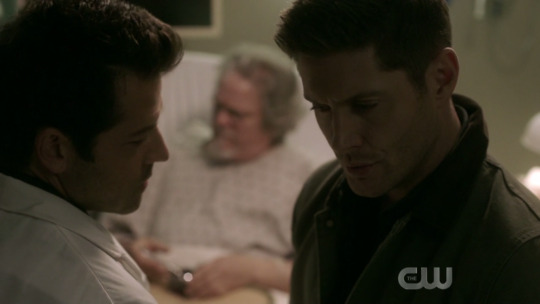
i can feel their body heat from here
-
THEY GOT CLOSER
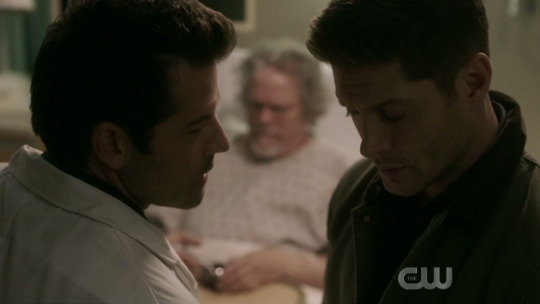
-
04:45

I HAVE MISSED SEEING THEM TOGETHER AND NOT ANGRY OR ACTIVELY DYING
-
CAS’ LIL SMILE
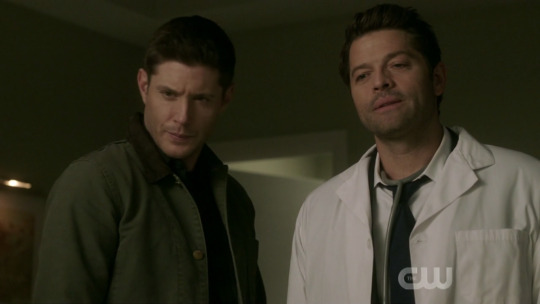
-
04:47
dean: “cas’ll catch you up”

BUT IS DEAN GONNA LEAVE FOREVER AND LEAVE CAS OH NO
-
04:50
sam: “donatello never quit fighting, so we could help him, because he never gave up”
OH MAN THAT GOT ME RIGHT IN THE DEPRESSION FEELS
I LOVE THAT THEY GAVE JARED THOSE LINES
-
04:51
sam: “i believe in us” *punch*
okay but i laughed and i probably shouldn’t laugh
but i did laugh
-
04:52
dean: “okay sam. let’s go home”
ok time to cry
-
04:52
dean: “but i do believe in us”
(cas walks up)
“i believe in all of us”
P E R F E C T
-
04:54


the end screen is white from the impala lights and i’m crying this was beautiful and perfect and HOW THE FUCK DID THE DEADLY DUO PULL THIS OFF
thAT PARALLEL BETWEEN DONATELLO AND DEAN THOUGH
THAT WAS LIKE...... ACTUAL WRITING
this was great??????/ and i’m emotional??????/ more emotional that i have been for ...um, pretty much every episode for like... 2 or 3 seasons, maybe
this was a 10/10 easily
jeeeez the suicide thing and sam talking dean out of it
look
y’all know how much i love dean and cas, and seeing them in the same place at the same time
but sam’s moment at the end was the best part of this whole thing
.........but. also.
i feel like dean and cas had a scene cut. as always. there was something missing there that i feel we were promised and didn’t get. please god let us get an actual conversation between them??? about their feelings for each other????????? it kind of sickens me that we haven’t had that yet. and it’s clearly almost happening, again and again and again and it’s definitely a romance trope, interrupted before they confess their feelings
a high point: dean and sam saved the asian kid from being killed by fire, that was both good and cool and i was very relieved
i’m a bit frustrated that nick is still ... happening
but at the same time, i find nick like 350% more interesting and enjoyable to watch than lucifer
there was a lot going on in this episode, as there always is in the buckleming episodes, but i watched in stops and starts because of cats and food and the wind slamming my door and my sister texting me, so if there were pacing issues i didn’t notice. it seemed pretty smooth to me idk
but i did really enjoy this, besides the gruesome murders and latino murdery guy (who was the best friend of the older twin brother (dean parallel), technically making the murdery guy a cas parallel?) killing people in horrible ways and then killing himself :/
also dean saying the guy was a psycho and then punching him out felt a liiittle bit like “people with mental health issues are evil and dangerous” and that felt uncomfortable EVEN THOUGH the guy WAS a bad murdery sort, and the whole episode was clearly also about helping people with depression or suicidal designs for themselves.
(now i type all this out, i’m realising the underlying messages of this episode were kind of messy. just a bit.)
edit: OR maybe that was dean’s self-hatred talking
(how and why did the next prophet in line have an enochian tattoo, if the pick is random? was it just coincidence? or did he get that tattoo after donatello started whispering to him?)
sarah...... she was clearly angry, and ghosts that’ve been around a long time tend to get verrrry angry, as i recall? she could’ve done some angry ghost stuff, that would’ve been more satisfying maybe (but on the other hand, the quietness of nick’s exit was also impactful)
i enjoyed the transition of red lights and backdrops throughout the episode to yellow and white, and then the green in the room at the end
anyway. yes. really did expect more on the dean-and-cas front, but i also expected to be let down, so i don’t really know where i stand on that. i just want more of them interacting in general ;~;
next week: MORE EMOTIONS!!!! YAY
#Elmie watches things#14x12#prophet and loss#spn spoilers#Destiel#post of postiness#deadly duo#season 14#I GOT THIS POST TO WORK YEEE had to re-upload each screenshot one by one u_u
69 notes
·
View notes
Note
if you don’t mind, what are you top 10 (or anything in the vicinity) gothic lit recs?
Sorry this took forever to answer! As is typical of me these days, I tend to answer my asks and empty out my drafts in big clumps around the time that breaks occur or semesters end (and guess whose semester just ended!). I also ended up puzzling over this question for longer than I thought, as I felt–given my blog’s general content–that there wasn’t much of a point in recommending Dracula and I wanted to avoid recommending any of the big titles in my field unless I was very personally attached to them (Don’t get me wrong, Frankenstein, Jekyll and Hyde, and Dorian Gray are all great things and you should read them, but they aren’t as close to my heart as Wuthering Heights or Northhanger Abbey.)
In any event, have my top ten gothic lit recs, ranked in rough order of my enthusiasm about recommending them.
1. Wuthering Heights (1847, Emily Brontë): I unapologetically love this novel and all the irredeemably awful people in it who are not Nelly Dean. (I’ve managed to find a sympathetic side to the character, but I still just viscerally dislike her.) It’s definitely my favorite gothic piece that seems to get accorded high status in the canon, and I first truly fell in love with it reading it out loud in the autumn with somebody I love, which is really the perfect way to encounter it.
2. The Werewolf of Paris (1933, Guy Endore): This novel is almost unknown nowadays, and it’s a real shame, as it ought to have been the werewolf genre equivalent of Dracula in terms of fame and influence. It deals with some heavy stuff (abuse, rape, incest, cannibalism, torture, suicide, massacres), both as regards the murders committed by the “monster” and the atrocities committed by collective groups of people and human institutions, and I’m not sure if I would completely agree with all of the moral messages it attempts to impart were I to re-read it today. Still, it’s a wonderfully written novel that treats its monster of choice with a subtlety I’ve not seen elsewhere in werewolf fiction, and it really appeals to the part of me who enjoys consulting Wikipedia to fact check the author’s own historical research.
3. Rebecca (1936, Daphne du Maurier): I have never simultaneously wanted to be and wanted to marry a first person narrator this much. This novel is a wonderful iteration of Gothic novels of the “I married this dude and his giant mansion has a spooky secret” genre, and Du Maurier’s use of language is breathtakingly gorgeous.
4. The Great God Pan (1895, Arthur Machen): Arthur Machen writes some of the best horror I’ve ever read, and The Great God Pan is remarkable as one of the few stories to truly unnerve me in the days after I read it. (I’m typically not one to be very rattled by books.) It’s mad science meets decadent aesthetics and it’s also a clear forerunner to some of the cooler stuff Loveraft does.
5. Northanger Abbey (1817, Jane Austen): Catherine Morland makes my fillings hurt with her sweetness, and Henry Tilney is forever #1 Austen hunk in my book hands down. I admit that I’m not much of a fan of early Gothic and Ann Radcliffe endlessly telling me about picturesque trees, but I’m intensely into this early parody of the genre, and I recommend it to anyone who might find themselves generally unenchanted with either Radcliffe or with Austen (given how different it is from her other novels).
6. Carmilla (1872, J. S. Le Fanu): Dracula will forever be the #1 vampire novel of my heart, but Le Fanu honestly has a much more beautiful prose style than Stoker, and I think that the short, ghostly, ambiguous novella he writes is a lot more chilling than Bram’s sprawling magnum opus. While Uncle Silas isn’t on this list (because it honestly wasn’t that great…), I think Carmilla’s also utterly fascinating as an inversion of the dynamics of Le Fanu’s major novel in which young women find strength in their love for one another in the face of genuinely malevolent patriarchs and meddling French governesses.
7. The Woman in White (1859, Wilkie Collins): Technically it’s “sensaton fiction,” but if there is an ominous figure lurking about the heath clad in white, I think your novel automatically gets to go under the Gothic umbrella. In any event, Collins is a fun, witty writer who knows how to write an enticing mystery, his use of the epistolary format is foundational and fun, and both Count Fosco and Marian Halcombe are majestically crafted characters that deserve the abundance of praise they typically get.
8. The Private Memoirs and Confessions of a Justified Sinner (1824, James Hogg): Imagine The Strange Case of Dr. Jekyll and Mr. Hyde only it was written earlier and is more confusing. Now imagine all of the early Gothic sensationalized Catholicism that would be typical of the era has been subbed out for early Gothic sensationalized Presbyterianism. That’s what this book is, and it holds the strange distinction of being one of the few stories to truly unnerve my Master’s thesis adviser in the days after he read it. It’s also a useful educational story to give to people who need clear examples of how to tell if their new best friend might be the devil.
9. The Beetle (1897, Richard Marsh): This novel is terrible in a lot of great ways and great in a lot of terrible ways. (It’s also just terrible in a lot of terrible ways, like it’s portrayal of sickeningly orientalist murder orgy cults as directed by gender ambiguous insect people.) One of its peak terriblegreat features, though, is my fave, Sidney Atherton, a mad scientist whom nobody seems to notice is a mad scientist, even though he’s monologuing about making an unstoppable death gas and killing his romantic rival’s cat.
10. Trilby (1895, George du Maurier): This book is vile, antisemitic garbage, and I would not fault anyone for opening it up, glancing at one of Du Maurier’s illustrations, and hurling it through a window. Still, it’s an interesting read if you’re looking into the origins of The Phantom of the Opera or, like me, you are very interested in the literary history of mesmerism. This is like… the holy grail of literary mesmerism texts. I also honestly do find Svengali, as awful a stereotype as he is, to be genuinely sympathetic in his desires to bring the celestial music he hears into reality, and there are moments where I think the prose is very evocative (I love the chilling phrase “flageolet of flesh and blood” to refer to a mesmeric subject, for example.)
#Wuthering Heights#Northanger Abbey#Carmilla#The Woman in White#The Great God Pan#The Werewolf of Paris#The Private Memoirs and Confessions of a Justified Sinner#The Beetle#Trilby#Rebecca#Anonymous
346 notes
·
View notes
Note
What is your opinion on ships seen as problematic? For example, incest, minor x major, large age difference, abuser x victim etc. PS. Girls can be addressed as 'dude' :p My friends (both guys and girls) call me dude all the time
Bahaha okay, dude! :D
… are you trying to get me in trouble *cries* I’m kidding. I think you’re genuine but like, shipping is terrifying business on this site. So this is a question without a straight answer and I’ll answer under a cut because all hell can break loose.
*looks at my list of ships* WELP
I mean, it’s no secret that a lot of my ships are considered problematic or at least attract large quantities of haters of varying levels of logic. Kurokura, for example, which is my new obsession because the angst and character development it offers are just delicious. Yes I know Chrollo killed Kurapika’s family and Kurapika killed some members of Chrollo’s surrogate family but within the context of Hunter x Hunter where like TG, like everyone is a murderer, it offers a potentially amazing and powerful story (not that it has a remote chance of canonicity because it does not). The best stories and often my favorite ships are often “problematic” or controversial because they provoke growth in the characters involved, and to do that, that means they can’t be perfect and imperfect people hurt each other. Life is problematic itself.
So, yeah, it’s fiction, and all fiction is problematic. I am very very VERY against any sort of “anti” culture. That’s just unhealthy and censorship and disgusting. You don’t have to morally justify liking or not liking anything in fiction, and the need to morally justify things sets off my alarm bells because I was raised in a cult.
That being said, of course there are ships I don’t like because they trigger me. The thing is, what someone considers problematic is affected by culture, by experience, etc., and just because you think x/y is problematic doesn’t mean someone else’s experiences are the same, and you don’t know how someone copes. The notion of judging someone for their fictional ships icks me out, with very few exceptions, and those exceptions are mentioned below.
Life isn’t black and white. Fiction is fiction, which means it is both part of reality since it was created within reality, and not a part of reality at the same time. Therefore “it’s fine they don’t exist” both is true but also not true. Paradoxes are how life works, lol!
So I’ll break down your ask:
Personally, what do you define as incest? I loathe immediate family ships, all of them (Luke/Leia? WHY). But cousins… usually I hate, but I ship Tsukiyama and Karren (admittedly before I knew they were cousins but whatever). You know that like 80% of marriages ever were between second cousins or closer? I understand that the world as a whole of moving away from this and hell yeah that’s a good thing, I’d love it if it stopped happening as I find the idea of dating any kind of relative icky icky icky. That being said in quite a few countries around the world even today, people intermarry, and it’s honestly full of very racist implications to say that most marriages ever were objectively morally wrong just because modern western culture says so. (Like, sorry to break this to you, but we’re all products of incest probably.) Sooooo, meh, I don’t like generally, but I’m not going to scream at someone that they’re evil because of it. Also, AUs wherein they aren’t actually related can be a thing! Remember wherein I said fiction is not exactly reality? It can be changed, whereas IRL relation cannot be changed.
What’s a minor x major? For example, Ayato is 18. Hinami is 17. I ship it. But ships with large age differences when one is coded at a different life stage do freak me out. I don’t like Hinami x Banjou AT ALL, for example, but it’s not inherently wrong for people to write AUs wherein Hinami is older and in a different life stage and falls in love with Banjou. In Disney, Snow White is like literally 14 and Ariel is like 16 and Idk how old their respective princes are (probably also teenagers) but contextually that’s normal for fairy tales, so I don’t care.
Age differences are not inherently wrong either; power dynamics can be a problem and I personally don’t usually like ships with giant age differences, but it’s not inherently wrong. But like a prepubescent child and a 30 year old? That is my “we have a problem here” red line. Fuck no. In that kind of case I would judge because that’s just raising all kinds of red flags because WTF is wrong with humanity. I have nothing to do with Loli or whatever the boy version of that is. That is my “I hate this and I judge” exception because. That strikes me as messed up and frankly wrong. But like, if someone is shipping a character canonically a kid in an AU wherein they have actually grown up and then fall in love with someone else, that might not be my thing but I’m not like, inherently disgusted.
Abuser x victim… so I notice a lot of people misdefine abuse on this site and cheapen its very meaning. Like Touka abusing Kaneki–no, that’s not how it’s coded in the story, and you can’t interpret stories without context or you’re misreading the text deliberately. I see a lot of whining about Kylo “abused” Rey by reading her mind–yeah, but she did the same thing back to him, and they weren’t in a relationship. Not that it’s in any way excusable or wasn’t wrong because it was (she wasn’t wrong to use it back as self-defense though), but it’s a story about space battles with phallic swords, look at it contextually, it’s not intended to be abuse. Honestly as an abuse survivor myself I find a lot of “X IS ABUSIVE” screaming on this site BEYOND offensive, and people who do that are actually harming survivors by not listening to us.
That being said, there are some ships that make me uncomfortable because of an abuser dynamic. Killgrave x Jessica Jones, for example, or Graves x Credence from Fantastic Beasts. I hate both those ships, but someone could write an AU wherein abuse never even occurs. For example I also ship Fururize AU despite the very clear abuse of Rize, but I like imagining AUs wherein Furuta and Rize get the chance to overcome their flaws and find happiness, wherein intervention occurred earlier so they never disintegrated to that point. In canon? NO. I do not want any Fururize in canon, please no.
Basically, to each their own. You’re in charge of your own fandom experience. Blacklist things your NOTPs to avoid being upset about them.
13 notes
·
View notes
Text
Let’s start with something my writer friends might yell at me for: In any narrative that’s not entirely visual, there’s going to be exposition. This happens, and I’m pretty sure it’s unavoidable. Someone, at some point, is going to just explain something. “Show, don’t tell” exists to encourage people to actually demonstrate what they’re talking about, rather than just wall of text at people at every turn. In essence, it’s insisting that you need to show the important parts to make a believable story with any emotional impact.
When we’re talking villain redemption, the critical component of a good redemption arc is the turning point. A turning point is used either to showcase the exact moment a villain’s motives and goals are called into question by the villain themselves, and serves as the tipping point for them to change their actions, or to emphasize how irredeemable a villain is by having them reject the introspection and continue to act as they have. The immediate example of this that comes to mind is Kira from JoJo part 4. Had he kept his head down, he could’ve lived the rest of his life comfortable and quietly with that family. Instead, he has too go all murderer again, and we’re shown that he’s beyond help. These turning point moments guide the rest of their development, and is the critical component that needs to be shown to make actions beyond that point believable and meaningful.
Again, examples are better, so let’s take a scenario in which ORAS had gone the alternate story route in the same way as USUM. In RSE, Maxie and Archie have their villain moments as you chase them around the region, watching them cause problems. At the end, they use the orbs to awaken the legends, and stare in horror as the sun/rains intensify. They comment aloud that this isn’t the world they wished for, and that everything is all wrong. In that moment, we see the introspection and the realization that they done goofed, and they begin to work toward stopping the problem before vanishing, only showing up to return the orb to its proper place.
Then, in ORAS, the same events happen, up until the time of awakening. When the beast awakens, Maxie/Archie disappear with them. They’re completely gone, you witness the devastation alone, and you go to battle the beast alone, maybe with Steve/Wallace’s help. When you return from the cavern, Archie and Maxie are just there, and Steven comes up to you and says “Hey, so I talked it out with them and they decided the ecosystem is probably okay as it is! They’re good now!” And the rest of the game, there are hidden scenes they have placed around where they might make statements like “I still wish to find a way to create more habitable land for people, but maybe the oceans are necessary too” or something along the lines of acknowledging the other side. Which one hits harder? The first, obviously. It shows the impact their actions had, the moment they looked within themselves and found their way, and made action to change. We don’t really see them being good at any point, but if we were told in a game that took place years after this that they were around and good people, we’d buy it. Because we saw the moment they changed as people. The second just has them uttering some vacuous nonsense about the other side having a point without really doing anything.
Or, supposed FRLG and HGSS took a different path. In RBY, Giovanni is fought several times, and at the end he disbands Team Rocket in shame. In GSC, you get the follow-up on Team Rocket disbanding, and maybe a scene of Giovanni contemplating his history before leaving for good. Then, in FRLG, you fight Giovanni only as the Gym Leader. You see him in the villain roles, but he never battles, always passing it off to others. You beat him, and you get something like “Not bad, kid.” And that’s it. You beat the rest of the game, and it ends there. Then in HGSS, Team Rocket is still disbanded, and you see Giovanni a lot after you beat the admins again, and he’s talking about how “Maybe the caring and love for Pokemon is what makes a trainer strong” but otherwise does nothing. Again, he’s not evil now, based solely on “he’s not doing anything evil, and he’s commenting on understanding the problem.” But there’s no justification. Again, without the moment of introspection on the part of the villain, subsequent actions that show they’re good feel like they came out of nowhere, and there’s no context for the alteration.
That’s what happened this gen. In SM, Lusamine unleashes the Ultra Beasts on the world to escape to her own paradise with Nihilego. We see her fuse with this being that she captured, and the beast she is now part of rejects her, nearly kills her, and it's her child that comes to her rescue at the last second. We see the experiences she had as a villain, and the final line she gets in the game is acknowledging that Lillie is "becoming beautiful." Similarly, Guzma we see within the world of Nihilego, now freaked out and defeated. He encountered something that he couldn't touch, much less beat down, and the creature was terrifying to him. The core of his being as the toughest dude alive is broken down, and we see his reaction to the world while within it. Because we see these things, we have justification for them to change. Do they? Not openly. Lusamine is apparently still having a rough time of it, and Guzma still hasn't internalized what Hala was trying to teach him, but in giving you his "lucky charm," he takes that first step. We don't see what lies beyond that, but we see the first moments of reform, and the transition is believable because we've gotten justification in the scenes that are shown to us. Had Lusamine come back late in SM post-game, and talked about how she’s considered changing, I’d buy it. Had Guzma been shown, later on, to have come to accept his losses and is working toward improvement, I’d buy it. I have been shown their tipping point, I have had the process shown to me, and we’re making progress. That is believable and significant to me.
In USUM, they handle it very differently. Let's start Lusamine. Lusamine's scenes are kept virtually the same, up until the very end of the Aether Paradise Invasion. They keep the Nihilego thing (and then do nothing with it, oddly enough; what was the point of that now?), and more significantly, they keep her snapping at Lillie that she has no children. Then, in the immediate scene after this, Lusamine is talking about how they're good kids and she's doing this to protect everything. Which...okay, that's some strong whiplash. From "You're both dead to me" to "You're good kids" in the span of under 3 minutes of gameplay. Incredible. Honestly I feel like that level of backpedaling on a character is enough to justify my distaste.
The next time you see her, she's being thrown back to your world by Necrozma and urges you to run. You do not do this, and instead go to fight Necrozma. When you return, Lillie tells you she talked it out with her mom, and they're on good terms now. Guzma gets the same problem. They come back from their Necrozma trip, which we don't see, and he just states he gets what's going on and bam, reformed. There's no struggle, no sense of reality to it. Essentially, there’s no follow-up. The turning point is critical to show, but it’s also pretty important to show an act of good. Maxie and Archie are a good example. They return the orb. It’s small, but it’s an act showing their change. Imagine if they’d kept that and had the fossilized legend in their basement, and you all have a good laugh about something with another character while they held the orb and the legend was right behind them. That’s what happened with Lusamine and the frozen Pokemon. Her “thinking about letting them go” is not action; the problem still persists, and nothing she does at any point shows her to be any different. She tells you she’s different. She tells you she might let things go, or that she’s not going to control Lillie and Gladion’s life. But there’s no presented action behind it. SM may not have shown us the end of that process, but it leads us through the first steps in a way that's far more believable than what USUM presents. USUM wants us to believe that they're beaten up, and suddenly now they're good. For reasons! If SM issue is "I don't see her change at the end," then USUM's problem is "I don't buy that she's actually changed."
To cap this off: "show, don't tell," as a concept, exists to state that the important details of your story need to be explicitly shown, rather than implicitly stated. If we're told a major event happened but don't see it, it feels like we're cheated. If a major change in a character occurred but we don't see it, it doesn't feel believable. The critical aspect of a redemption arc isn't that they get to be good. That's the outcome at the end of the road. The critical component is seeing the turning point. When we see the turning point, it's easy to accept that a redemption has occurred or will occur, (ie, "when did you start becoming beautiful?"). In fact, stories sometimes use the demonstration of this turning point, followed by the villain not accepting it, in order to show how irredeemable someone is. It's important to have that moment to establish the impact of a change, or the impact of a refusal to change. Without being shown a turning point, a villain's redemption is now implicit. We're left to just believe that the turning point occurred and that it was justifiable (ie, "We talked it out and it's fine now!"). One presents a situation in which, regardless of the villain's choice, that choice has meaning. The other presents a situation in which no choice was made, things just happened. I don't think I need to explain which one carries the emotional impact.
As a few miscellaneous points for the responses on the other posts, because I can’t not:
I commented that Lusamine is one of the most villainous villains not based on global impact, but on emotional impact. It’s the same deal as the old Voldemort/Umbridge dichotomy. Voldemort’s bad and a problem for everyone, but Umbridge is the evil you know all too well, so its portrayal is familiar and powerful. Lusamine hits home in a way that most world-ending villains don’t, so I count her as one of the best villains in the series in that regard.
My problem with Rainbow Rocket isn’t that Giovanni leads, it’s that Giovanni is the only one with a point being there. The others have no story influence. Archie and Maxie literally state that Giovanni is just letting them stay there, and Cyrus just wants to go home. Only Ghetsis has an alternate plan, but his is just jumping on Giovanni’s plan and hoping he can control Giovanni. Everything hinges on Giovanni. If you want a celebration of all villain teams, you could’ve easily made a post-game where Looker and Anabel team up with you to take down the Rainbow versions of each organization, which all have their own motives and stories. Instead, they’re pushed into Giovanni’s without purpose and they all seriously feel neglected.
Necrozma is a problem for the same Voldemort/Umbridge reason above. Necrozma has a more global impact, but no emotional impact. It’s just a force of nature that’s a threat in its current state that you have to stop. Going from a villain that is entirely emotional impact to something that’s just a nebulous enemy with no bearing on the people present feels like a downgrade.
Lusamine is 100% a damsel in distress in the post-game. She’s unconscious, Giovanni’s trying to turn her into a mindless puppet, and your entire involvement is going in to save her. She is, by literal definition, a damsel in distress. And for your first female villain in the series, that’s...really bad. Especially following SM.
However, I will concede that I hadn’t considered Guzma wanting to fight and beat down UBs as his own reward for tagging along with Lusamine. So that was an interesting point to read. I also can’t argue that many of their traits are different across games, but the issue isn’t the traits, it’s utilization of those characters that causes problems for me.
I will also concede that not getting to fight Mother Beast is the greatest disappointment of the century. I was hoping they’d fix that by having Lusamine fuse with Nihilego to fist-fight Necrozma, but alas, they did not do that.
22 notes
·
View notes
Text
FoZ Notes 20
Here we go. We’re really getting into Elves and the larger state of the world now!
----------------------------------
Somehow Derflinger was fully aware of everything that happened to Saito after the prior swordbody broke. He refuses to talk further on the whole "Gandalfr/Sasha using me to stab Brimir through the heart" thing because Sad.
Tiffania continuing to have self-esteem problems. Dammit. Can we go back to Badass Line Tiffania?
An island (kinda) known as the Dragon's Nest, a bizarre mass of pillars of stone sticking randomly out of the ocean. Luctiana has a friend who lives here. It used to be a volcano, but not anymore. Oh wait the buddy lives somewhere underwater. Luctiana apparently expects Tiffania and Saito to just be able to hold their breath for the whole dive, but when they object she rolls her eyes and casts a spell that lets them temporarily breathe underwater because of course such a spell exists. Oh and she makes Derflinger temporarily rustproof, because of course.
Said waterbreathing spell apparently turns water into air as it enters the throat. That... sounds really miserable, actually, but the story treats that as a perfectly good explanation with no unpleasant implications whatsoever.
Turns out Luctiana's friend is inside one of the pillars. Said friend? A massive Water Dragon called Mother Sea. She's actually a Rhyme Dragon because of fucking course. Dark silver scales that look blue at a glance somehow. Coral horns. Rhyme Dragons live long enough that Mother Sea's grandmother was a little girl six thousand years ago.
Mother Sea asserts that Rhyme Dragons have accepted they're going extinct so, like, whatever man. 's all cool dude. Bizarrely, she talks about God's will instead of, you know, the Great Purpose. And even though she keeps referring to Brimir as The Devil.
Wait, Luctiana is asserting 'barbarians' have no sense of shame in regards to kissing? Goddammit, she introduced herself completely naked and soaking wet! This isn't even cultural difference stuff with deliberate irony. This is just shit writing.
Finally get explicit confirmation that Shaitan's Gate/Devil's Door is the same place Halkeginians call the Holy Land. Derflinger alludes to a "Teleportation Gate", which is probably the same thing. I can already see the writing on the wall: whatever idiocy I'm imagining now regarding the Gate, canon will trump it.
There's a, what, third kind of Water Dragon? It gets compared to both eels and crocodilians. And it's a dumb, aggressive creature. You know, like Saito.
Derflinger just... talking underwater, ain't no thang. I... can't really criticize it (It’s not like he’s got vocal chords or whatever) but I still don't like it.
Submarine hidden in the sea nearby Dragon's Nest. Nuclear sub, specifically. And somehow Saito's Weapon Feedback Bullshit allows Derflinger to know that its power source is 'particles banging into other particles'. aaaargh
To no one's surprise except Saito (because he's retarded) the nuclear sub has nuclear weaponry. Shocking.
Oh my fucking god Luctiana ALSO has a spell for allowing people to talk underwater. (The quality gets compared to a shoddy radio)
For a minute there I thought the author was going to be quasi-intelligent and have Saito consider threatening the Elves by firing the nuke from the submarine. There'd be a lot of problems with this idea, but they're manageable, particularly when you consider that Colbert is a TinkerSpark. But noooo, Saito has looted the thing -because nuclear ICBMs are very small and lightweight, you see- and is thinking to himself how he can threaten the Elves via manually detonating the thing. This is insanely stupid nonsense, quite literally suicidal, and if he has to get close to detonate the thing they can just, you know, wreck the nuke -nukes aren’t even something that detonates explosively when shocked or something! This is just a bad plan on every level I can think of.
Supposedly the familiar summoning spell's words don't matter, only the feeling "in your heart". I have manifold issues with this claim, particularly since it's being introduced out of nowhere to justify Tiffania performing the summoning when the story finally feels like having it actually happen.
Oh my fucking god we FINALLY got a kind of explanation for Tiffania having a Ring of Andvari! Only ten volumes too late! Still no explanation for how she knew how to use the damn thing, though. Oh, and Elf Mom died by lol throwing herself in front of Tiffania when a knight tried to kill Tiffania. Yeah. Sure. THAT makes sense for an all-powerful wargod (ie an FoZ Elf) to do, as opposed to... casting Counter, or making the knight's head explode, or whatever.
Seriously fuck this author.
Elven council meeting room... is at the top of the tower? That's not what we were told last volume. [I seem to have lost almost all my notes from last volume on the Elves? Not sure how that happened. You’re not missing much, though]
"Steed-blooded party", an Elven political faction. They seem to be the Elven version of ultraconservative Catholics. Bidashal hates them.
As is typical of Japanese fiction, political leaders just don't want any fuckups happening on their watch so that nobody can blame them for said fuckups. So the Elven council is a bunch of people who don't want to do anything because they might get blamed if things don't work perfectly.
Bidashal is the Chairman of the Barbarian Countermeasures Committee.
For some reason, the Elves A: know Luctiana brought Saito to the Dragon's Nest and B: find this utterly horrifying. [The second bit actually kind of makes sense later. The first bit is never explained or justified]
Turuk is the current head of the Elven council. He's an old man in the same mold as Osmond, though so far not perverted, just a drunkard... wait a second. Osmond is supposed to be OLD, when we're introduced to him! Like possibly over two centuries old! I think the author entirely forgot about that, given how the story has been talking about Halkeginian and Elven ages for volumes unending.
Elves have a crime of "ethnic rebellion". It's unclear what it is, other than punishable with death. Really not selling me on this noble, peaceful Elves thing, here. The "Steel-bloodedparty" is all about killing traitors and 'devils', further undercutting said noble/peaceful thing. For that matter, the idea that they're wise and stuff is being undercut by how politicking for personal gain is occurring even though the Elves basically think they're on the verge of an apocalypse.
The Dragon's Nest apparently is where Earth crap gets dumped en mass by interdimensional shenanigans.
It's a super-duper secret that Shaitan's Gate connects to our Earth. 'Devils' seems to get used to mean Earth humans.
Elven "Nydus" Navy is made of "Dragon Whales". They look exactly like whales, but with scales. No, really, that's what the text says. I’m not mocking it here. I wish I was mocking it.
Fatima Hadat. A Steel-Blooded Party Elf woman with no practical combat experience but a drill sergeant's attitude anyway. She's trying to make up for an aunt's shameful behavior. Also Steel-Blooded Party members are Soviet Union people?? (Comrade etc etc all the time)
Mother Sea has been collecting the junk from Earth, thinking it's Halkeginian or Elven litter, basically.
Finally the story reveals that Dragon's Nest is Shaitan's Gate/the Holy Land. Credit where it's due: this makes perfect sense and I failed to figure it out before the story spelled it out. Six thousand years ago, this area was dry land.
Elves have rifling, Halkeginians... also have it, but nobles have suppressed it because they don't want peasantry getting good weapons. Eeeeeh. We also hear some nonsense about Halkeginian nobles believing weapons to be 'the path to evil'. Since when? And this is from the omniscient narrator, keep in mind, not some biased character where I could assume they’re just out of touch with the rest of their culture.
I just realized I'm halfway through this volume and Louise hasn't had ANY screentime. Would like to punch the author now.
Saito theorizing Derflinger has an Imp-style memory block Sasha put on him that prevents him from remembering things if they would threaten Elves. Sorry, no, shit explanation. A for effort, F for execution.
Random assertion from Derflinger that only 'skilled' Elves can use Counter. You know, that way we can justify Saito being able to win against Elves even though Louise is absent from the plot. Narratively-convenient construction strikes for the five millionth time! Don't think too hard about the fact that he's facing Elven soldiers who logically should be trained fighters, you'll just get an aneurysm and/or an all-consuming desire to murder the already-dead author.
Elves have Windstone-powered guns that work wet.
Oh. Here's the idiotic payoff of all this shit of Tiffania wanting to meet "Elves like her mother": her mom is Fatima's shame-bringing aunt, and Fatima recognizes her ring’s remains (Because remember, the Stone of Andvari part got used up) and gets pissed. sigh
WHAT the FUCK. Tiffania casting Summon Familiar SUMMONS FUCKING SAITO.
NO. THAT IS BULLSHIT. THIS IS THE FUCKING WORST.
YES IT'S BEING USED TO TURN SAITO INTO A FUCKING GODDAMN DOUBLEFAMILIAR KILLKILLKILLKILLKILLKILLKILLKILLKILL
Over with Vittorio he's talking with Julio about feeling bad about his lies: A, there is no 'device'. B, the Void ritual won't stop the Wind Stone Catastrophe. Sasha, the elf, was Gandalfr+other familiar six thousand years before Saito ARGHBLARGHLE THIS STORY IS SHIT
Now Julio is ALSO BECOMING A DOUBLEFAMILIAR BECAUSE HE'S AN EVEN BIGGER MARY SUE THAN SAITO MURDERVERYTHINGIT'STHEONLYWAY
Ominous dialogue implying it's somehow critically important to have the master/familiar folk die while in love with each other.
Elven airships are dragon-towed. The story pretends like this is a superior methodology to Halkeginian airships. Pffffff.
Utterly bullshit claim that Elves perform trade with Halkeginians, implied claim that Halkeginian nobles hate Elves but civilians aren't afraid of them or anything. So all that shit earlier of peasants thinking Elves are cannibals and so on? lol whatever man consistency is for, like, non-shit writers.
So remember how before there was a Germanian castle at the border of the Elf/Germanian border, in desert? Yeah, NOW there's "the Unexplored Lands", a vat region of forest and plains mostly occupied by demi-humans and separating Elven desert from Germanian land. Consistency is for losers lol!!! (Beastmen, ogres, and avianmen, specifically, not that this means much to the audience)
So you remember how alchemy/transmutation is the most basic of earth magics? Hahahahaha the author doesn't, asserting that Guiche is useless in an aerial battle because earth affinity lol.
Claim Elven airships have never lost to Halkeginian airships.
The Sahara has wild boars. I have no idea how plausible this is, so I’ll let it ago. Even if it is bullshit, it just does not rate compared to the whirling shitstorm of everything else going on.
This volume and the previous are implying there's a fair amount of language shenanigans occurring in the original Japanese. Stuff like Elf/people of the desert and Void/work of the devil being indicated to have been said via kanji shenanigans. I'm sort of disappointed at the evidence being that the unusual choice for desert Elves is probably just a pun that’s not surviving into English.
Urge to kill rising. Ali just saved Saito and Tiffania because... ostensibly because he's saving Luctiana and so he will need their help since saving her makes him a race traitor, but that's bullshit. It's just a super-thin way of ALMOST killing off Tiffania for DRAMA and then not having it stick. Fuck this writer.
Ali ALSO grabbed Fatima, because of fucking course.
So after making a big deal about that submarine [As in: Luctiana found the idea of an undersea boat just fucking unimaginable, and not in the “there’s no way barbarians have pulled that off!” sort of way, but in the “That’s not a thing anyone could possibly do!” sort of way] earlier... it turns out Elves have submarines based on having the Stupid Breed kind of Sea Dragon drag around an airfilled whatsit. This is fucking ridiculous, it's like the author has an active hatred of consistency and quality.
End volume.
--------
Aaaaand that's all she wrote.
Volume 21 is barely translated, and volume 22 isn't translated at all. So I'm done until such time as volume 21 gets translated.
This fucking series, goddamn.
So, since it's not gotten into by this point in the story, I went and used the Familiar of Zero wiki to look up what the fourth Familiar actually does: firstly, they can burn their life force to enhance their master's spells. Which. Why? The story has already established that people can do this with their own life force, why does it require a specific special familiar to be able to tap someone else's life force? Secondly, they can "stockpile spells" to "turn themselves into basically a bomb", whatever the wiki means by that.
Honestly, I'd forgive basically anyone for throwing it out entirely and replacing it with something more consistent with the other Void Familiars. Oh, and if I haven't mentioned it already, the name is Lífþrasir, supposed to be "the heart of God".
So. Yeah. I could see someone having coasted through the prior volumes, not thinking too hard and not noticing how the story is inconsistent nonsense, but holy fuck are we experiencing a sudden, extreme dip in quality. And the worst part is it looks like much of it was intended for a long time, so I don’t think I can blame this on whatever killed the author, if he like died of illness or something.
Fuck this series.
5 notes
·
View notes
Link
This week on Dear Television:
Let Aaron Bady and Sarah Mesle sing you a song of love and war, friendship and betrayal, ICE and FIRE. In association with Home Box Office Productions, we bring you a saga like no other. Travel with us to the mysterious, ancient land of Westeros, where nothing is as it seems. THRILL as beloved characters disappear before your eyes! CHILL as your worst nightmares come true! TWEET whenever you see continuity errors! TEXT YOUR FRIENDS when these dudes yet again blow it with their garbage gender politics! Unsullied beware: many of the deepest secrets of the Seven Kingdoms and the dramatic conclusion of this song of ice and fire will be revealed in these essays. As the world turns, we know the bleakness of winter, the promise of spring, the fullness of summer and the harvest of autumn — the game of thrones is complete.
¤
Previous episode: Season Eight, Episode Five, “The Bells”
¤
But Why, Though?
by Aaron Bady
Dear Television,
This show long ago backed itself into a corner in terms of how it could end, and, last night, smashed its face in the corner, smiling. Someone had selected Jon kills Daenerys, the dragon melts the Iron Throne, and Bran is the new king on their bingo card: congratulations, you won the prize!
If you strain, there’s an underlying logic to it: even enlightened despots are bad, we’ve decided, and democracy is hilarious, obviously, but since all the real power-brokers are dead, the remaining half-assed aristocracy has decided to shift power a rung down the ladder (with a place-holder semi-king), which gets something like the status quo ante back, though it’s unclear why this outcome would be better or worse than a variety of alternatives. It requires a very generous reading even to deduce that that is what’s happening. But it could have gone a half-dozen ways just as easily, and nothing about how it actually went last night felt more surprising, inevitable, or satisfying than the multitude of scenarios that people had dreamed up. Ideally, a good climax would have taken you by surprise in the moment, but as it sank in, you would have realized how it had been earned by what came before; and after the show was over, you’d have been satisfied by what it all added up to and meant.
The show has pulled that off before: Ned Stark’s death and the Red Wedding (and Cersei’s big victory) are obvious examples of successful climactic moments. The show’s ruthlessness was shocking, but made sense as you thought it through. Those surprises reinforced an essentially tragic tone and message: the Game of Thrones had winners and die-ers, and, since valar morghulis (all must die), even winning just buys you time until you die and someone else can win. Power is treachery, and treacherous; the Game of Thrones is The Wheel, endlessly turning (or the astrolabe from the title sequence) with its heartbeat the accompanying theme music, the show’s true MVP, a song that never ends and never changes.
I hoped the show had another shock like that in its back pocket. The more fool I; Jon killing Daenerys was, to put it bluntly, not it. There was no element of surprise since other major characters were begging him to do it, and neither actor did anything interesting in the scene except look as surprised by what was happening as we were supposed to be. It also wasn’t earned, and didn’t feel like it meant anything: if Daenerys’ tragic flaw was the self-justifying cycle of “killing the bad guys,” why was killing her the solution to her turning bad? Why didn’t Jon Snow seize the throne afterwards (wasn’t everyone’s argument that he would be the best King?) How did he get imprisoned? Did he confess? Grey Worm’s actions make no sense; he had literally been executing soldier nobodies who had surrendered, just because, but the guy who killed his queen he just tosses in jail? And then accepts the jurisdiction of A Random Collection of I Guess These Are The High Lords and Ladies of Westeros Now when they free him? Offscreen? Why does Jon Snow go to the Actually There Isn’t A Night’s Watch Anymore So I Guess We’ll Just Roam North Epically? I mean, Tyrion can just walk out of prison and become the Hand of a king who he also just happened to appoint? Why did Grey Worm accept any of it? Why didn’t all the lords and ladies follow Sansa’s example and declare independence? Why is Bronn in charge of four castles or whatever, just because TYRION promised it to him?
WHY DID ANY OF IT, in short. What are the peasants up to? Which gods ordained all of this?
(The outcome was so beyond baffling that I found myself fixating on little things. When the Iron Throne was melted by dragon-fire, it should have been grand and dramatic and terrible, and instead it was just funny; did the dragon burn the chair-made-of-swords because he saw his mother murdered by a sword and blamed the chair? Can we really blame him for jumping to that conclusion, given what nonsense the rest of the plotting was?)
For me, the best example of the sort of thing that I’d foolishly hoped the show might do, last night, was the season six revelation of Hodor’s name. Not only shocking, earned, and tragic, but narratively productive, opening up a new dimension in the show’s temporal fabric. Through the head-fuck of Bran accidentally changing the past (or, rather, what the past had already always been), the show suggested a lot of new narrative possibilities, most interestingly, that Bran was himself both the Night King and “Bran the Builder,” my personal favorite missed opportunity: while mortals fought their petty wars, the cosmic backdrop could have turned out to be one guy’s transhistorical war with himself, building walls to stop himself from killing himself, and ruining so many lives by accident along the way.
Instead, it was all downhill once the show killed off the Night King. Without him, Bran’s plot didn’t make much sense and it seemed clear that the showrunners neither knew what to do with him — since he was functionally omniscient and no one ever asked him any questions — nor would there be much for him to do. So, of course, they made him King, and made his kingship the endpoint of whatever crazy hand has been guiding the plot. Was it the Lord of Light? The old gods? The new? The many-faced God? The show’s entire religious structure seems to have had a hand in saving him to become King, but what Tyrion and the rest of them seem to value about him is that he’s an ego-less cipher. Going a step beyond Douglas Adams, the only person who can be trusted with power is someone who not only doesn’t want it, but who isn’t even a person. And yet, who made Bran king? As ludicrous as Tyrion’s speech is — and as ridiculous as it is that Grey Worm and the lords and ladies accept it — an awful lot of deus ex machina had to happen to make this outcome possible. “Why do you think I came all this way?” is a goddamned good question, Bran, and we’d like some goddamned answers.
We got no answers. If we aren’t satisfied — and I’m not — one reason is that the show wanted to stick the landing and there just wasn’t a landing to stick. It shouldn’t have tried. They wanted to have it both ways, an ending that would be “bittersweet,” the showrunners said, probably imagining something like putting sugar in chocolate or coffee. Instead, it was like pouring lemonade into beer; yes, there was some bitterness, and yes there was some sweet, but there was also just so much that it ultimately tastes horrible.
At its best, this show could have it both ways on a lot of things because there was always more to the story. The weird mix of the Hollywood sensibilities of the showrunners — who loved them some Good Princes and Evil Zombie Hordes — and the (somewhat) more interesting genre-bending agenda of the anti-Tolkienesque author could work because the resolution of that weird emulsion was deferred, still working itself out. There was so much yet to be revealed and explained, and the game kept going on, that the presumed possibility of an ending that would work was in the back of your mind the whole time. And so the show got to live firmly within the genre’s expectations — princes, prophecies, apocalyptic doom, and heroism — while also subverting them with a grounded cynicism about politics. All the contradictions became riddles to be explained, a map filled with empty spaces; red herrings could be not-yet-revealeds and plot holes were wait-and-sees. Any character abuse could seem to be in service of some larger narrative that wasn’t yet completed, and thus, couldn’t yet be judged a failure. As long as the prince that was promised never came, we could keep waiting; the moment he did, and the show reached its conclusion, we could suddenly look at what it had done and judge it, and for the first time, the emptiness of the show was unavoidable. Like a shark, the moment it stopped moving forward, it started to die.
Obviously, the show and the showrunners don’t understand this. They went down a list, giving endings to each story which seemed to them to be plausible and appropriate, which they superficially all are. But the reason they don’t add up to anything larger is that there is nothing larger in the show: democracy is laughable because no one else exists in this show except characters with names. Most of them are now dead, but the few who remain — including long-lost second-stringers like Robin Arryn and Uncle Edmure — showed up at the end to collectively Fortinbras our way back to whatever passes for normalcy in this world. The totalitarian threat is dead — and the democratic one is inconceivable — so we’re back to the same old small council chairs.
And this, in a way, is the real problem: even after the ending, the world has to go on, and when it does, it undoes the finality of everything that happened in the finale. The story continues (even as it ends) because at some point in the future, it won’t anymore: Bran will die without children, and a new political order will be born. But this new way to defer the show’s resolution — picking a non-King for the Iron Throne that doesn’t exist anymore, the solution to hereditary kingship because he’ll be the last of his name — only works to the extent that we’re not going to see it happen. And so we don’t: the show ends, so that it can continue.
Yours, walking somewhere, forever,
Aaron
The post Game of Thrones, “The Iron Throne” appeared first on Los Angeles Review of Books.
from Los Angeles Review of Books http://bit.ly/2HFpGxW
0 notes